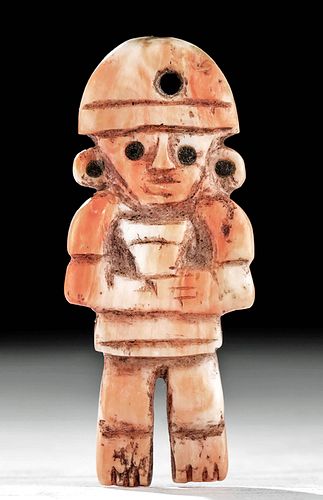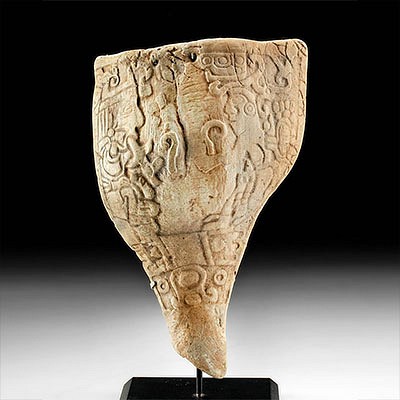Chimu Spondylus Pendant of an Elite Male
Lot 13
About Seller
Artemis Gallery
686 S Taylor Ave, Ste 106
Louisville, CO 80027
United States
Selling antiquities, ancient and ethnographic art online since 1993, Artemis Gallery specializes in Classical Antiquities (Egyptian, Greek, Roman, Near Eastern), Asian, Pre-Columbian, African / Tribal / Oceanographic art. Our extensive inventory includes pottery, stone, metal, wood, glass and textil...Read more
Estimate:
$1,000 - $1,500
Absentee vs Live bid
Two ways to bid:
- Leave a max absentee bid and the platform will bid on your behalf up to your maximum bid during the live auction.
- Bid live during the auction and your bids will be submitted real-time to the auctioneer.
Bid Increments
| Price | Bid Increment |
|---|---|
| $0 | $25 |
| $300 | $50 |
| $1,000 | $100 |
| $2,000 | $250 |
| $5,000 | $500 |
| $10,000 | $1,000 |
| $20,000 | $2,500 |
| $50,000 | $5,000 |
| $100,000 | $10,000 |
| $200,000 | $20,000 |
About Auction
By Artemis Gallery
Oct 15, 2020
Set Reminder
2020-10-15 12:00:00
2020-10-15 12:00:00
America/New_York
Bidsquare
Bidsquare : Art of the Americas - Ancient to Present
https://www.bidsquare.com/auctions/artemis-gallery/art-of-the-americas---ancient-to-present-5840
Ancient and ethnographic art from cultures encompassing the Americas - Pre-Columbian, Native American, Northwest Coast, Spanish Colonial, more. All legally acquired, all legal to sell, all guaranteed to be as described or your money back. Convenient in-house shipping! Artemis Gallery info@artemisgallery.com
Ancient and ethnographic art from cultures encompassing the Americas - Pre-Columbian, Native American, Northwest Coast, Spanish Colonial, more. All legally acquired, all legal to sell, all guaranteed to be as described or your money back. Convenient in-house shipping! Artemis Gallery info@artemisgallery.com
- Lot Description
Pre-Columbian, North Coast Peru, Chimu, ca. 1100 to 1450 CE. Skillfully carved from spondylus shell of vibrant orange and cream hues, a figural pendant depicting an important standing male figure who holds a kero in his hands before his chest as if about to take a drink or make a libation offering. He wears a tumi-shaped headdress and large round earspools. Both the earspools and his wide open eyes are inlaid with a black shell. An intriguing amulet from ancient Peru, perforated through the headdress, making it perfectly ready to suspend from a cord or chain. Size: 2.3" H (5.8 cm)
Spondylus shells, also known as spiny or thorny oysters for obvious reasons, have been revered by Andean peoples since the Pre-Columbian era. In addition to being featured in their artwork and used as currency, Spondylus pieces served as sacred offerings to Pachamama, the earth/time mother, a version of Mother Nature. The Spondylus shell carries numerous symbolic meanings. A symbol of fertility and elite social status, it was also believed to be an omen of rain, warning the indigenous of El Nino. In fact, the Spondylus shell only appears when the water becomes warmer during December - the time of the El Nino current - immediately before the rainy season.
Provenance: private Toronto, Ontario, Canada collection; ex Ancient Resource Auction, 2012; ex Joel Malter collection
All items legal to buy/sell under U.S. Statute covering cultural patrimony Code 2600, CHAPTER 14, and are guaranteed to be as described or your money back.
A Certificate of Authenticity will accompany all winning bids.
We ship worldwide and handle all shipping in-house for your convenience.
#153207Intact. Minor surface wear with slight scuffs/nicks. Deposits grace the surface.Condition
- Shipping Info
-
All shipping is handled in-house for your convenience. Your invoice from Artemis Gallery will include shipping calculation instructions. If in doubt, please inquire BEFORE bidding for estimated shipping costs for individual items.
-
- Buyer's Premium



 EUR
EUR CAD
CAD AUD
AUD GBP
GBP MXN
MXN HKD
HKD CNY
CNY MYR
MYR SEK
SEK SGD
SGD CHF
CHF THB
THB














